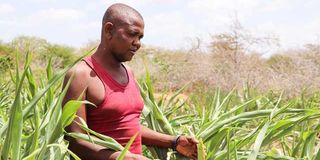Food sovereignty: An illusion or can it end hunger?

Musembi Musau, stands on his sorghum farm during an interview in Wamasa Village, Kinango, Kwale County. The variety of sorghum he now plants is drought resilient and takes less time to mature.
When I wrote the article “Pro-GMO farmers are not villains” (DN, Jan. 30), I got reactions from people whose main concern with GMOs was that it did not embrace the food sovereignty movement.
The movement was conceived in 1996 for peasants and rural people but has been gaining traction with anti-globalisation bodies. In brief, it is the right for people to define their agriculture path, with food as a right and not a tradable commodity. It also advocates for an equitable sharing of food-producing resources in a sustainable way.
But it conflates many issues—from global food trade, indigenous food production and having localised value chains and others. Therefore, as a commercial farmer, I can’t align myself with it as it would be akin to the proverbial trees that voted for the axe believing that with its wooden handle, it was one of them and would protect them.
Countries will always be in competition for food. This will be complicated by issues of fair trade, subsidies, climate change and politics. But countries that will be food-secure and have surplus for sale are those that give their farmers incentives, use agri-science and mechanisation and reduce post-harvest losses, in a sustainable environment.
Unfortunately, there are people facing hunger in our country. But we should respectfully agree that to be food-secure, it will not be by movements but by having farmers who are well compensated. If we hold the utopian idea that food can be non-tradable and without an alternative mechanism for compensating farmers, we will eventually kill the business that we need to put food on the plate.
On the concept’s emphasis on peasants and indigenous farmers, without being ashamed of our roots, these labels sound derogatory to Kenyan farmers. For, besides professionals who engage in farming, high literacy rates, and access to the mobile phone, radio and TV in local languages has changed the profile and demographic of the Kenyan farmer.
The so-labelled peasants want to improve their lives with better education, housing and leisure - which they are happy to do from the proceeds of their farming. On their own volition, they choose to be commercial farmers and they should therefore not be encumbered by movements that shrink their potential as well as their market range.
The movement also advocates empowering farmers to own their farm-to-fork food value chains to maximise profits. But that should come with the caution that, if there is irregular supply, lack of skill, finance and brand recognition, farmers may suffer great losses by holding on to their produce.
Lastly, we need to acknowledge that large-scale farmers and transnational agri-companies have a role to play in our becoming food-secure. With the absence of the government on the ground, they are often the pioneers of new crops, farming methods and markets.
A movement that begrudges the large players, would deny the small-holder farmers mutual benefits such as contract farming, extension services and free farmers' field days they offer. Let’s be careful not to radically shift the goalposts out of the playing field and be left holding a begging bowl.
Ms Munene is the manager, Lukuai Farm-Laikipia. [email protected].




